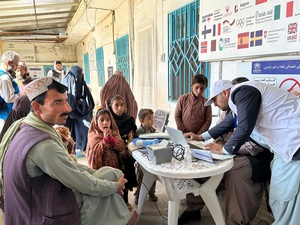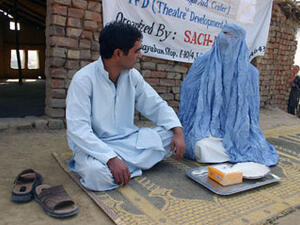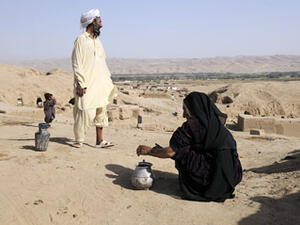Afghanistan: 50,000th returnee
Afghanistan: 50,000th returnee
More than 55,000 Afghan refugees have repatriated from Pakistan since the movement began March 1. The 50,000th returnee arrived in Mohmandar, eastern Afghanistan, on Monday via the famed Khyber Pass from Pakistan's North West Frontier Province.
Over the last five years, an average of about 100,000 Afghans repatriated yearly from Pakistan to Taliban-controlled Afghanistan. In less than three weeks, we have already helped more than half that number return. The change in government and the relative stability afforded by the Afghan Interim Authority have spurred an enormous amount of interest in repatriation.
We expect that by the end of the day today, more than 60,000 Afghans will have left Pakistan since we began the facilitated repatriation programme on March 1. Afghans seeking our assistance package are registered at our centre in Takhtabaig, outside Peshawar, before crossing into Afghanistan in their own vehicles or in hired trucks.
We provide Afghans repatriating under the UNHCR/Afghan Interim Authority initiative with $20 upon their arrival in Mohmandar to finance their onward travel. With three to four families returning in every truck, participants in the programme usually have some cash left over once they reach their villages.
Families receive a kit from UNHCR containing various relief items, including two blankets, two shawls, two sweaters, one plastic tarpaulin, one jerry can, one bucket, 50 kgs of charcoal, one cooking stove, one heating stove, five bars of soap, one hygienic kit and 150 kgs of wheat from the World Food Programme. UNHCR's partner, GTZ, has opened seven out of 32 planned centres where Afghans participating in our facilitated return programme can collect the kits. Some will later be provided with shelter materials.
At the current pace, it appears we may see more than the 400,000 Afghans we had anticipated would possibly return voluntarily this year. In the coming weeks, we will open six more registration centres in Pakistan that should facilitate the departure formalities and ease the congestion at Takhtabaig.
UNHCR and the Iranian government expect to open similar registration centres to help Afghans in Iran homewards in a similar initiative slated to start on April 9.
Security remains precarious in many parts of Afghanistan, and people returning are briefed about the situation in their homeland and warned to avoid certain areas, particularly in eastern and northern Afghanistan, as well as in the south-west. Afghans also undergo mine-awareness training.
We estimate that there are more than 3.7 million Afghan refugees worldwide, including 2 million in Pakistan and 1.5 million in Iran.









